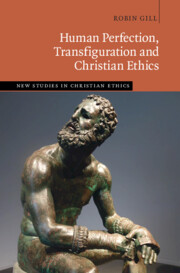Book contents
- Human Perfection, Transfiguration and Christian Ethics
- Reviews
- New Studies in Christian Ethics
- Human Perfection, Transfiguration and Christian Ethics
- Copyright page
- Contents
- Acknowledgements
- Introduction
- Part I Human Perfection
- Part II Jesus’ Perfection
- Chapter 5 Be Perfect, as Your Heavenly Father Is Perfect
- Chapter 6 Was Jesus Perfect?
- Part III Transfiguration and Global Perfection
- Select Bibliography in Christian Ethics
- Index
- Titles Published in the Series (continued from page )
- References
Chapter 6 - Was Jesus Perfect?
from Part II - Jesus’ Perfection
Published online by Cambridge University Press: 09 May 2024
- Human Perfection, Transfiguration and Christian Ethics
- Reviews
- New Studies in Christian Ethics
- Human Perfection, Transfiguration and Christian Ethics
- Copyright page
- Contents
- Acknowledgements
- Introduction
- Part I Human Perfection
- Part II Jesus’ Perfection
- Chapter 5 Be Perfect, as Your Heavenly Father Is Perfect
- Chapter 6 Was Jesus Perfect?
- Part III Transfiguration and Global Perfection
- Select Bibliography in Christian Ethics
- Index
- Titles Published in the Series (continued from page )
- References
Summary
Chapter 6, continuing an analysis of Hebrews’ claim, examines the question ‘Was Jesus Perfect?’ or, perhaps better, ‘In what sense for Christians was Jesus perfect?’ It returns to separate discussions half a century ago by Eric Mascall and Karl Rahner, and eventually reaches a conclusion closer to Rahner than Mascall. This conclusion hinges on the, now more widely accepted, evidence within the Synoptic Gospels that Jesus mistakenly thought that the Parousia was imminent. The work of the Baptist George Raymond Beasley-Murray is seen as crucial here. Finally, this chapter identifies the Synoptic accounts of the Transfiguration, along with 2 Peter, as crucial to early perceptions of Jesus’ perfection.
Keywords
- Type
- Chapter
- Information
- Human Perfection, Transfiguration and Christian Ethics , pp. 119 - 144Publisher: Cambridge University PressPrint publication year: 2024



